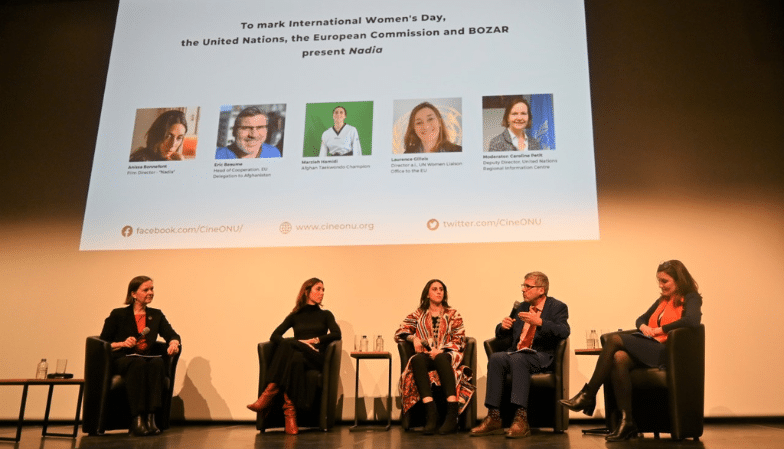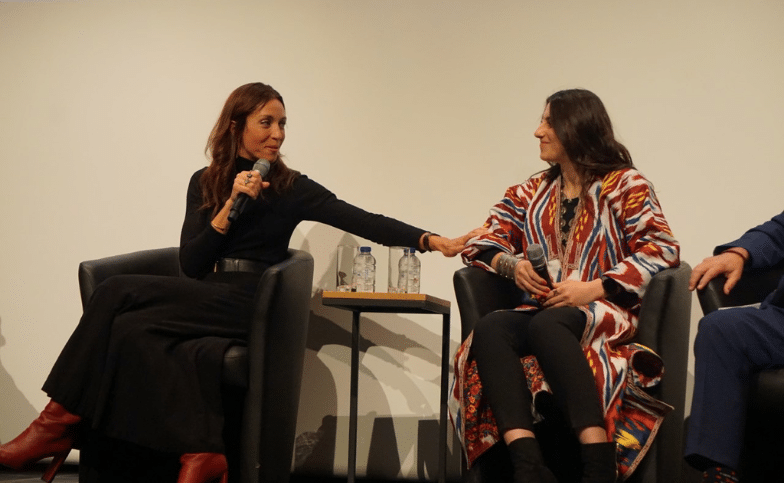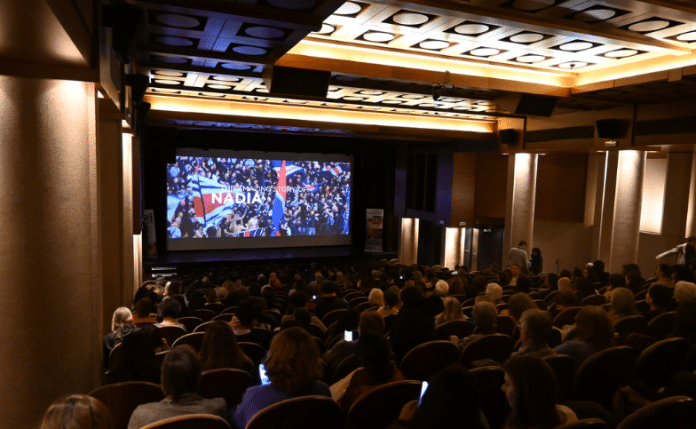To mark International Women’s Day, the UN Regional Information Centre in Brussels hosted a screening of Nadia with the support of UN Women, the European Commission, Bozar and four UN agencies (UNESCO, UNDP, UNFPA, OHCHR). This screening was part of the popular UN Cinema/Ciné ONU programme that showcases films and encourages dialogue on important UN themes.
Anissa Bonnefont’s documentary tells the inspiring story of football star and UNESCO Champion for Girls’ and Women’s Education, Nadia Nadim, on her quest to reconnect with her Afghan roots.
After fleeing the Taliban as a child, Nadia moved to Denmark where she discovered her love of football whilst living in a refugee camp. This passion has taken her across the world; she has played for professional clubs in Denmark, the USA, the UK and France and has played over 100 matches for the Danish national team.
On screen, Nadia, who recently qualified as a reconstructive surgeon, explored her identity as a woman, an Afghan refugee and an accomplished athlete.
The screening was introduced by the Director of the UN in Brussels, Camilla Brückner, who dedicated the annual event “to women and girls in Afghanistan” and around the world.
The film was followed by a panel discussion with Anissa Bonnefont, the film’s director, Marzieh Hamidi (Afghan taekwondo five times gold medal champion), Eric Beaume (Head of Cooperation at the EU Delegation to Afghanistan) and Laurence Gillois (Director a.i. of UN Women Brussels). The debate was moderated by UNRIC’s Deputy Director, Caroline Petit.

Inspirational stories
The world of sport magnifies societal problems — behind inspirational success stories lie tales of discrimination and adversity. Anissa Bonnefont discovered this hidden side of sport while filming. She told the audience about the many problems that Nadia, and her Paris Saint-Germain Féminine teammates, faced including low pay, living far from family and choosing between a career and motherhood.
In many ways, Nadia’s story echoed that of Afghan taekwondo champion, Marzieh Hamidi. During the panel debate, Hamidi recounted the discrimination that she experienced as a female athlete in Afghanistan. However, like Nadia, sport helped Hamidi create a space where she could freely express herself. What’s more, since the fall of Kabul, taekwondo has become her way of fighting against the Taliban and everything the regime stands for.
Hamidi also shared her experience of living as a refugee and especially how it has affected her idea of identity and belonging. Born in Iran to Afghan parents who had fled after the Taliban first seized power, Hamidi told the audience how she never felt Iranian nor at home in her country of birth. After returning to Afghanistan, Hamidi was then forced to seek asylum in 2021 and is currently living in France. She spoke movingly about her friends and family that she left behind, and how they motivate her to fight harder.

Giving a voice to Afghan women
Hamidi and Nadia’s stories bought attention to the recent erosion of women’s rights in Afghanistan. Today, conditions are the same as, if not worse than, those when Hamidi’s family and Nadia fled the country over 20 years ago. “History is repeating itself” noted Laurence Gillois, who warned the audience that hard-earned progress has been wiped out.
Despite the complex political situation, both Gillois and Eric Beaume applauded the resilience and strength of Afghan women. Caroline Petit was inspired by “the stories of such strong Afghan women both on the screen and on the stage,” and “the power of documentary films to convey compelling stories and keep women’s rights in Afghanistan on the radar.”
Bonnefont revealed to the audience that Nadia wanted the film to give “a voice to women from Afghanistan and around the world.” Gillois also stressed the importance of listening to Afghan women and Beaume spoke about how the EU and UN, as well as other actors, are working together “to hear the voice of Afghan women and girls, support and empower them.”
When she is not training for the 2024 Paris Olympics, Hamidi is a vocal women’s rights activist. She told the audience how she uses social media to share the views of Afghan women who are unable to speak out.
Calls for action
The UN, EU and humanitarian partners are working hand in hand to improve the situation of Afghan women in spite of difficult working conditions. Beaume pointed out that the EU is the only western diplomatic delegation currently in the country and, along with Brückner and Gillois, reiterated the importance of building strong partnerships with civil society and international actors.
Responding to a question from the audience about how to help women in Afghanistan, Hamidi called on the public to push their governments to support them. This echoed the sentiments expressed by the UN Deputy Secretary-General, Amina Mohammed, after her visit to Afghanistan in January 2023. “The message is to stay engaged, because there are over 20 million women and children’s lives at risk. And stay engaged to make sure we can pull Afghanistan back from their precipice to the international community,” she told UNRIC.

